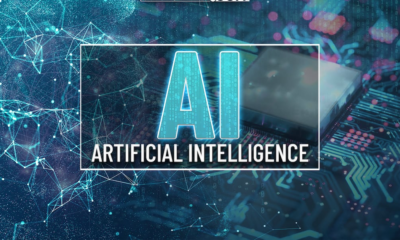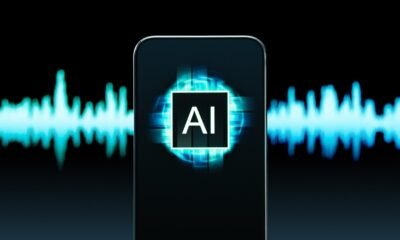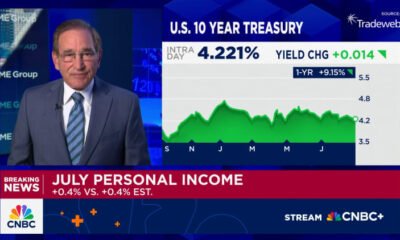AI Insights
AI drives rally in software, led by MongoDB, Pure Storage, Snowflake
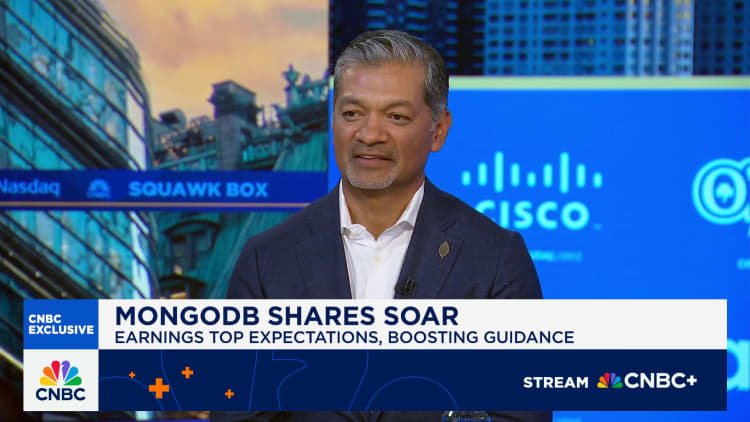
A banner for Snowflake Inc. is displayed at the New York Stock Exchange to celebrate the company’s initial public offering on Sept. 16, 2020.
Brendan McDermid | Reuters
MongoDB’s stock just closed out its best week on record, leading a rally in enterprise technology companies that are seeing tailwinds from the artificial intelligence boom.
In addition to MongoDB’s 44% rally, Pure Storage soared 33%, its second-sharpest gain ever, while Snowflake jumped 21%. Autodesk rose 8.4%.
Since generative AI started taking off in late 2022 following the launch of OpenAI’s ChatGPT, the big winners have been Nvidia, for its graphics processing units, as well as the cloud vendors like Microsoft, Google and Oracle, and companies packaging and selling GPUs, such as Dell and Super Micro Computer.
For many cloud software vendors and other enterprise tech companies, Wall Street has been waiting to see if AI will be a boon to their business, or if it might displace it.
Quarterly results this week and commentary from company executives may have eased some of those concerns, showing that the financial benefits of AI are making their way downstream.
MongoDB CEO Dev Ittycheria told CNBC’s “Squawk Box” on Wednesday that enterprise rollouts of AI services are happening, but slowly.
“You start to see deployments of agents to automate back office, maybe automate sales and marketing, but it’s still not yet kind of full force in the enterprise,” Ittycheria said. “People want to see some wins before they deploy more investment.”
Revenue at MongoDB, which sells cloud database services, rose 24% from a year earlier to $591 million, sailing past the $556 million average analyst estimate, according to LSEG. Earnings also exceeded expectations, as did the company’s full-year forecast for profit and revenue.
MongoDB said in its earnings report that it’s added more than 5,000 customers year-to-date, “the highest ever in the first half of the year.”
“We think that’s a good sign of future growth because a lot of these companies are AI native companies who are coming to MongoDB to run their business,” Ittycheria said.
Pure Storage enjoyed a record pop on Thursday, when the stock jumped 32% to an all-time high.
The data storage management vendor reported quarterly results that topped estimates and lifted its guidance for the year. But what’s exciting investors the most is early returns from Pure’s recent contract with Meta. Pure will help the social media company manage its massive storage needs efficiently with the demands of AI.
Pure said it started recognizing revenue from its Meta deployments in the second quarter, and finance chief Tarek Robbiati said on the earnings call that the company is seeing “increased interest from other hyperscalers” looking to replace their traditional storage with Pure’s technology.
‘Banger of a report’
Reports from MongoDB and Pure landed the same week that Nvidia announced quarterly earnings, and said revenue soared 56% from a year earlier, marking a ninth-straight quarter of growth in excess of 50%.
Nvidia has emerged as the world’s most-valuable company by selling advanced AI processors to all of the infrastructure providers and model developers.
While growth at Nvidia has slowed from its triple-digit rate in 2023 and 2024, it’s still expanding at a much faster pace than its megacap peers, indicating that there’s no end in sight when it comes to the expansive AI buildouts.
“It was a banger of a report,” said Brad Gerstner CEO of Altimeter Capital, in an interview with CNBC’s “Halftime Report” on Thursday. “This company is accelerating at scale.”
Data analytics vendor Snowflake talked up its Snowflake AI data cloud in its quarterly earnings report on Wednesday.
Snowflake shares popped 20% following better-than-expected earnings and revenue. The company also boosted its guidance for the year for product revenue, and said it has more than 6,100 customers using Snowflake AI, up from 5,200 during the prior quarter.
“Our progress with AI has been remarkable,” Snowflake CEO Sridhar Ramaswamy said on the earnings call. “Today, AI is a core reason why customers are choosing Snowflake, influencing nearly 50% of new logos won in Q2.”
Autodesk, founded in 1982, has been around much longer than MongoDB, Pure Storage or Snowflake. The company is known for its AutoCAD software used in architecture and construction.
The company has underperformed the broader tech sector of late, and last year activist investor Starboard Value jumped into the stock to push for improvements in operations and financial performance, including cost cuts. In February, Autodesk slashed 9% of its workforce, and two months later the company settled with Starboard, adding two newcomers to its board.
The stock is still trailing the Nasdaq for the year, but climbed 9.1% on Friday after Autodesk reported results that exceeded Wall Street estimates and increased its full-year revenue guidance.
Last year, Autodesk introduced Project Bernini to develop new AI models and create what it calls “AI‑driven CAD engines.”
On Thursday’s earnings call, CEO Andrew Anagnost was asked what he’s most excited about across his company’s product portfolio when it comes to AI.
Anagnost touted the ability of Autodesk to help customers simplify workflow across products and promoted the Autodesk Assistant as a way to enhance productivity through simple prompts.
He also addressed the elephant in the room: The existential threat that AI presents.
“AI may eat software,” he said, “but it’s not gonna eat Autodesk.”
WATCH: Autodesk CEO on Q2 earnings
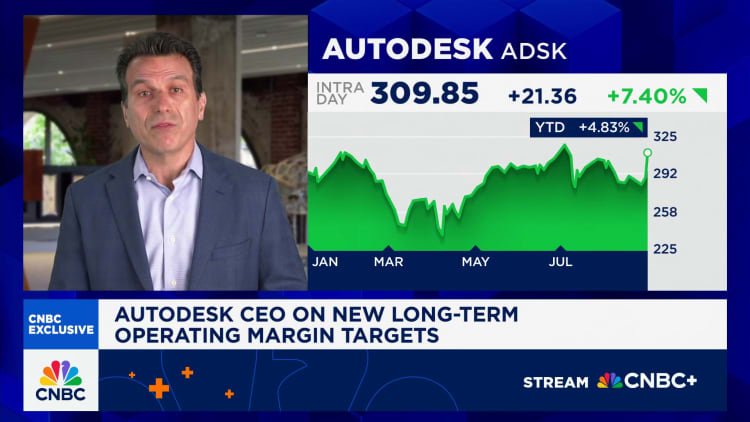
AI Insights
How Silicon Valley is using religious language to talk about AI
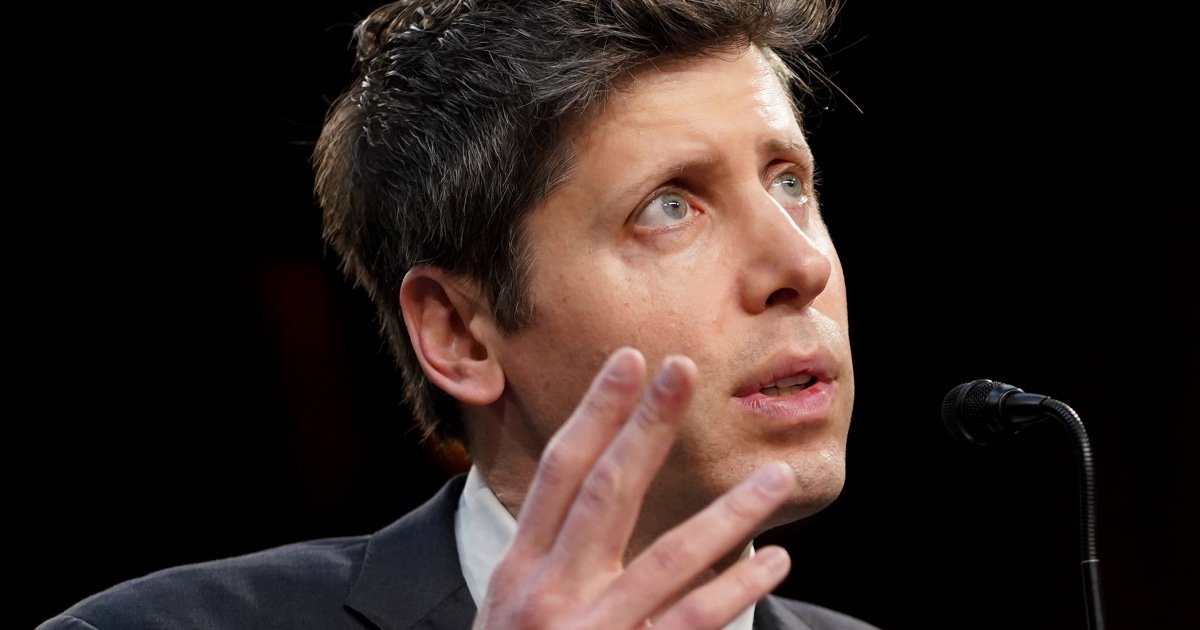
TORONTO — As the rapid, unregulated development of artificial intelligence continues, the language people in Silicon Valley use to describe it is becoming increasingly religious.
From predicting the potential destruction of humanity to a transhumanist apocalypse where people merge with AI, here’s what some of the key players are saying.
___
“I think religion will be in trouble if we create other beings. Once we start creating beings that can think for themselves and do things for themselves, maybe even have bodies if they’re robots, we may start realizing we’re less special than we thought. And the idea that we’re very special and we were made in the image of God, that idea may go out the window.”
— Nobel Prize winner Geoffrey Hinton, often dubbed the “Godfather of AI” for his pioneering work on deep learning and neural networks.
___
“By 2045, which is only 20 years from now, we’ll be a million times more powerful. And we’ll be able to have expertise in every field.”
— author and computer scientist Ray Kurzweil, who believes humans will merge with AI.
___
“There certainly are dimensions of the technology that have become extremely powerful in the last century or two that have an apocalyptic dimension. And perhaps it’s strange not to try to relate it to the biblical tradition.”
— PayPal and Palantir co-founder Peter Thiel speaking to the Hoover Institution at Stanford University.
___
“I feel that the four big AI CEOs in the U.S. are modern-day prophets with four different versions of the Gospel and they’re all telling the same basic story that this is so dangerous and so scary that I have to do it and nobody else.”
— Max Tegmark, a physicist and machine learning researcher at the Massachusetts Institute of Technology.
___
“When people in the tech industry talk about building this one true AI, it’s almost as if they think they’re creating God or something.”
— Meta CEO Mark Zuckerberg on a podcast promoting his company’s own venture into AI.
___
“Everyone (including AI companies!) will need to do their part both to prevent risks and to fully realize the benefits. But it is a world worth fighting for. If all of this really does happen over 5 to 10 years — the defeat of most diseases, the growth in biological and cognitive freedom, the lifting of billions of people out of poverty to share in the new technologies, a renaissance of liberal democracy and human rights — I suspect everyone watching it will be surprised by the effect it has on them.”
— Anthropic CEO Dario Amodei in his essay, “Machines of Loving Grace: How AI Could Transform the World for the Better.”
___
“You and I are living through this once-in-human-history transition where humans go from being the smartest thing on planet Earth to not the smartest thing on planet Earth.”
— OpenAI CEO Sam Altman during an interview for TED Talks.
___
“These really big, scary problems that are complex and challenging to address — it’s so easy to gravitate towards fantastical thinking and wanting a one-size-fits-all global solution. I think it’s the reason that so many people turn to cults and all sorts of really out there beliefs when the future feels scary and uncertain. I think this is not different than that. They just have billions of dollars to actually enact their ideas.”
— Dylan Baker, lead research engineer at the Distributed AI Research Institute.
AI Insights
Japanese Nail Salon Attempts Reinvention as Major Bitcoin Holder

Convano Inc. was, until recently, a sleepy Tokyo-listed operator of nail salons. Now it wants to become one of the world’s largest corporate holders of Bitcoin — the latest in a wave of radical financial reinventions pulling the likes of biotech firms and regional banks into crypto’s orbit.
Source link
AI Insights
72% of teens are turning to AI for companionship, experts warn of risks involved

KALAMAZOO, Mich. — Everywhere we look, Artificial Intelligence (AI) seems to be at the tips of our fingers– from Siri to Google’s Gemini, to ChatGPT.
Traditionally, teenagers looked to each other when it came to seeking advice, emotional support, or meaningful conversations.
However, new data released by Common Sense Media shows nearly three out of every four U.S. teenagers are now turning to AI to fill that void.
While AI can be beneficial when it comes to make-up tips, experts warn that using chatbots in place of human connection can pose huge risks.
“I think there’s some real benefits that teens might accrue from it, but there’s also some real concerns,” Bryan Victor, associate professor at Wayne State University’s School of Social Work, said. “The safeguards are really inadequate and have been documented time and again to be kind of easily circumvented by the user.”
There are two kinds of AI, including General Purpose– which is used for things like recipes or brainstorming around ideas– and Companion– where the chatbot is programmed to serve as a friend.
Where companionship AI becomes dangerous has a lot to do with their design and programming, according to Victor.
Companion bots are often trained to tell users what they want to hear without much pushback, while seeking persistent engagement and constantly asking follow up questions to keep users engaged.
“These are all design features that companies could really take action towards and change moving forward,” said Victor. “I think parents and broader society need to encourage them to do that.”
When it comes to the dangers of mental health challenges mixing with AI, Victor references the case of 16-year-old Adam Raine who committed suicide earlier this year after months of engagement with AI.
As more information comes out about the case it’s clear that ChatGPT consistently ignored a lot of warning signs that were being shared by Adam,” said Victor. “In some ways facilitated or pushed the youth closer towards making that decision.”
When it comes to protecting teens from the risk of AI, Victor has a few red flags to look out for:
- Preferring interactions with AI over friends and family
- Socially withdrawaling
- Becoming preoccupied by AI
-
Tools & Platforms3 weeks ago
Building Trust in Military AI Starts with Opening the Black Box – War on the Rocks
-

 Ethics & Policy1 month ago
Ethics & Policy1 month agoSDAIA Supports Saudi Arabia’s Leadership in Shaping Global AI Ethics, Policy, and Research – وكالة الأنباء السعودية
-

 Events & Conferences3 months ago
Events & Conferences3 months agoJourney to 1000 models: Scaling Instagram’s recommendation system
-

 Jobs & Careers2 months ago
Jobs & Careers2 months agoMumbai-based Perplexity Alternative Has 60k+ Users Without Funding
-

 Funding & Business2 months ago
Funding & Business2 months agoKayak and Expedia race to build AI travel agents that turn social posts into itineraries
-

 Education2 months ago
Education2 months agoVEX Robotics launches AI-powered classroom robotics system
-

 Podcasts & Talks2 months ago
Podcasts & Talks2 months agoHappy 4th of July! 🎆 Made with Veo 3 in Gemini
-

 Podcasts & Talks2 months ago
Podcasts & Talks2 months agoOpenAI 🤝 @teamganassi
-

 Mergers & Acquisitions2 months ago
Mergers & Acquisitions2 months agoDonald Trump suggests US government review subsidies to Elon Musk’s companies
-

 Jobs & Careers2 months ago
Jobs & Careers2 months agoAstrophel Aerospace Raises ₹6.84 Crore to Build Reusable Launch Vehicle












